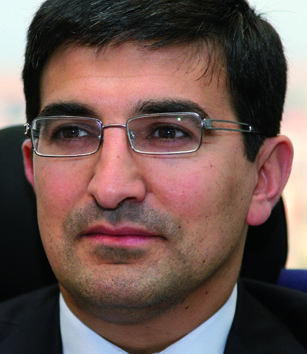Social inclusion as a guiding principle – ONCE
The aims and goals that inform and underpin the success of ONCE can apply to any business sector, says the Head of Legal José Luis Barceló Blanco
Una de las corporaciones de ciegos líderes en Europa, ONCE se conoce sobre todo por sus quioscos visibles en la mayoría de calles céntricas de las poblaciones españolas. Lo que no se conoce tanto es qué hay por detrás. Los principios de inclusión social definen la integridad y estructura interna de la corporación, afirma José Luis Barceló Blanco, director jurídico. Su gestión en el departamento jurídico es un reflejo y puesta en práctica de los objetivos y principios de la ONCE en la sociedad.
Walk down almost any High Street in Spain and you will likely see a ONCE lottery sales booth. It is a non-profit organisation that focuses on the improvement of the quality of life of people with blindness or severe visual impairment, and the booths are staffed by its members.
The values that define ONCE’s activities permeate throughout the organisation, says José Luis Barceló Blanco, Head of Legal at the ONCE Foundation. “The wider aim is to promote social inclusion and this principle extends not only to the ways in which we manage the activities of the organisation but also staff it.”
ONCE (The Spanish National Organisation for the Blind) was established in 1938 with the goal of enabling its members to earn a living through the sale of coupons (lottery tickets), the first draw for which was held in May 1939.
Through the ONCE Foundation and ONCE Business Corporation (CEOSA) it offers employment to over 123,000 people, whether directly or indirectly,
and operates specialist care activities
for more than 70,000 members. ONCE’s first training, job centres and rehabilitation services opened in the 1960s, and it has gone on to influence similar societies around the world, including in Latin America where it operates through the ONCE Foundation for Latin America (FOAL).
The specific goal of the ONCE Foundation is to promote social inclusion for all disabled people and is allocated three percent of the Group’s gross lottery sales, explains Barceló Blanco. “A main activity is to encourage companies to recruit disabled people which activity is managed through the FUNDOSA Group. This has established close relations with many Public Administrations but in order to win contracts has to compete on the same terms as any other private business.”
FUNDOSA has revenues of around €300m and employs over 14,000 people, with a particular focus on services in the leisure, industrial and telemarketing sectors. It is currently a lead supplier to the national rail operator Renfe for reservations and other telephone services, but has also developed niches in care homes and appliance recycling plants.
When Barceló Blanco first joined ONCE in 1996 the Foundation counted only three lawyers: Today there is a team of 11 – 70 percent of whom have some form of disability – plus two lawyers on secondment from law firms. He was appointed Legal Director in 2002 and now sits on the Committee of Directors and is Secretary to the Board of Fundacion ONCE and FUNDOSA.
“What is important is that internally ONCE reflects both its membership and the organisation’s principles. But beyond that the structure is relatively traditional. Fundamentally what we look for in our lawyers are excellent technical skills and the ability to adapt.”
The core internal focus is on commercial and company law issues, employment and litigation, and public and private contracts and transactional law. But ONCE’s lawyers have also to understand its social and commercial objectives and to be aware of the financial implications of decisions – on this basis they are better placed to take decisions, believes Barceló Blanco.
“We are encouraged to get involved with business decisions and the growth of the department has been driven by the growing sophistication of ONCE’s needs but also the increased strategic role we are required to play.”
Among the initiatives the legal team has also been involved with has been the creation of the Forum for Responsible Public Contracting; working with public authorities and private companies, with Board Members drawn from Microsoft, Acciona and FCC among others. The aim of the Forum is to seek legislative amendments requiring the inclusion of social clauses in every public contract. It is an initiative that aptly reflects the lobbying role ONCE plays, concludes Barceló Blanco.
“Open access to the opportunities available in society is not a privilege but a right. Physical and social boundaries however get in the way of equality and kill the rights and freedom of the individuals. It is a question of human rights.”
José Luis Barceló Blanco is the Head of Legal at the ONCE Foundation, part of ONCE a membership organisation for blind and visually impaired people
Subscribe now to receive your copy of Iberian Lawyer












